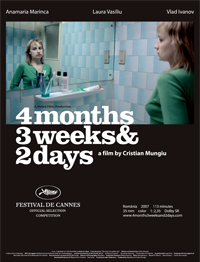
|
4 Months 3 Weeks and 2 Days review
:. Director: Cristian Mungiu
:. Starring: Anamaria Marinca, Laura Vasiliu
:. Running Time: 1:53
:. Year: 2008
:. Country: Romania
|
4 months, 3 weeks and 2 days. That's the time she will have waited to decide on an abortion. She is Gabita, a young, naive and fragile student overwhelmed by the decision she makes, at a time when abortion is considered a crime by Ceaucescu's regime, who was concerned about not losing his labor force. It's 1987, a few years before the fall of Communism. The young woman lets her friend Otilia manage the situation for her. A hotel room reservation, necessary funds collected for the clandestine operation, a meeting with the mysterious Mr. Bebe. A meeting for which neither one is prepared.
Similar to The Death of Mr. Lazarescu, by Cristi Puiu, 4 Months, 3 Weeks and 2 Days is directed in a virtuosic, naturalist style with a handheld camera, which sometimes pans at 360 degree or moves several dozens of meters, without additional music, exploiting the natural light (certain parts of the shots sink into semi-darkness leaving the soundtrack-noises of Otilia's steps and the panting of unrestrained running to occupy the entire space), and especially, favoring the sequence shots. All of which lends to a stretching of time where the drama gets all its weight. Rather skillful, Cristian Mungiu avoids a number of usual traps, managing to instill a sordid and heavy environment without yielding to demonstration, the recourse to poetic tones certainly helping. Notably off camera is the scene where the two young friends agree to exchange their bodies in exchange for the operation, or during the course of the dialogue they begin once Mr. Bebe has left.
Carried from beginning to end by his actors, with Anamaria Marinca at the helm, the film mainly lingers on human feelings, Mungiu's camera taking the time to let them appear, to spout out with the turn of a phrase or with a glance. Essentially about the relationship between the two young women, one all frankness and innocence, the other all force, assuming for two the weight of the responsibility. A force which is exhausted in heavy silences, particularly faced with the shock of generations and social classes in a poignant scene of a family meal.
The only flat note is the emphasized shot of the fetus lying in the bathtub. Whereas he has shown an unquestionable intelligence in suggesting rather than showing, here the director takes the feelings of the audience hostage while lingering on a corpse. What a pity.
Moland Fengkov
Translated into English by Anji Milanovic

 Movie Reviews: 1998 - 2011 Movie Reviews: 1998 - 2011
 Movie Reviews: 2012 - present Movie Reviews: 2012 - present
|
|


